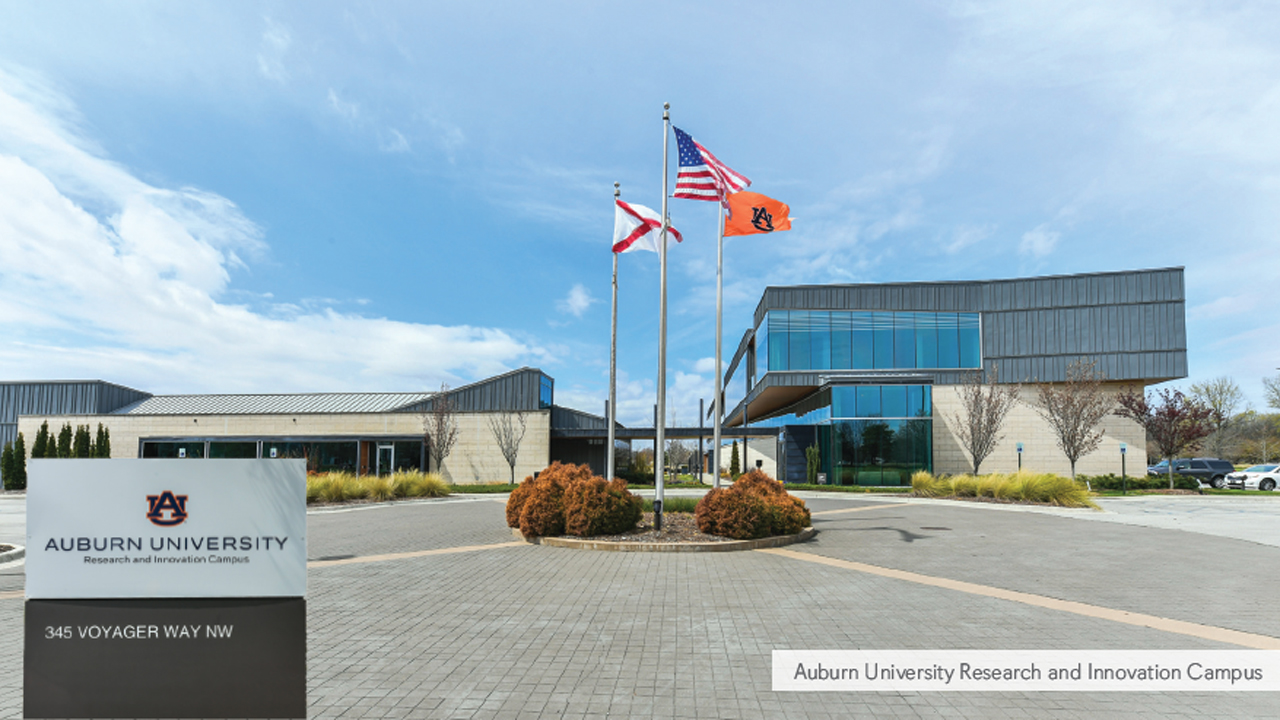Research Centers
By Editorial Staff

State-of-the-Art Research and Innovation campus
Auburn University is expanding its footprint in the Huntsville area with the acquisition of a new research facility located in the Cummings Research Park.
The university reached an agreement with LogiCore Corp. to purchase two buildings with more than 40,000 square feet of space situated on a nine-acre parcel of land at 345 Voyager Way NW.
Located within minutes of Redstone Arsenal’s Gate 9 entrance and near many of Auburn’s research partners in defense, aerospace, law enforcement, cybersecurity and biotech sectors, the facility will significantly expand Auburn University’s presence in the fastest-growing tech hub in the country, establishing a permanent foundation from which Auburn can leverage its regional reputation and thriving public-private partnerships into unprecedented national prestige and influence.
Designed to foster a new era of interagency and interdisciplinary collaboration necessary to secure the nation into the next century, the facility will serve as a state-of-the-art research space, collaboration engine and conference center that will focus Auburn’s expertise and next-generation resources on the defense, aerospace and law enforcement agencies that call Redstone Arsenal home.
“We are excited about the opportunities to expand our research capability in Huntsville, which is home to many members of the Auburn Family and our valued research partners,” said former Auburn University President Jay Gogue. “We hope this facility will quickly become the primary connection for the Huntsville community to Auburn University and will be the go-to destination for government and industry entities around Redstone looking to meet in an unbiased, trusted location for technical interfacing.”
Game-changing Advanced Structural Engineering Laboratory
In June 2021, Auburn Engineering officially dedicated the $22 million Advanced Structural Engineering Laboratory (ASEL). The ceremony took place in front of an audience that included former Auburn University President Jay Gogue, several members of the Auburn University Board of Trustees and nearly 200 guests of the college.
The ASEL is a state-of-the-art 42,000-square-foot facility that includes a high bay laboratory with a strong wall and strong floor specially engineered to handle extreme structural testing loads. Inside the building, there is a geotechnical chamber within the floor, a materials research and testing laboratory, hurricane-level wind testing capabilities and spaces for faculty and graduate student research. The lab houses the only test chamber in the nation that is included in a university laboratory and will allow the conduction of geotechnical research on foundations, anchorages and towers previously only possible in the field.
“This is a world-class lab that in my opinion is second to none,” said Auburn University Trustee Charles McCrary, ’73 mechanical engineering and retired president and chief executive officer of Alabama Power Company. “We can make this world a safer place because of this facility. It’s an engineer’s dream.”
Committee to Autonomous Vehicle Research
The National Center for Asphalt Technology (NCAT) at Auburn University debuted its new $800,000 autonomous vehicle research facility in February 2021. Located at 560 DeVall Drive, the facility, which is attached to the NCAT test track, will aid researchers in the GPS and Vehicle Dynamics Laboratory (GAVLAB), led by David Bevley, the Bill and Lana McNair Distinguished Professor of mechanical engineering and Scott Martin, assistant professor of mechanical engineering.
The facility includes a garage with multiple bays and lifts for commercial trucks and passenger vehicles, office space for researchers, a conference room and an observation area overlooking NCAT’s 1.7-mile oval test track. The GAVLab focuses on the robust control of autonomous vehicles using GPS and Inertial Navigation System sensors using three main thrusts: sensor fusion/integration, on-line system identification and adaptive control techniques.
“The GAVLAB and our other transportation engineering researchers have brought in nearly $50 million in sponsored research awards over the past three years,” said Steve Taylor, associate dean for research. “This new facility is an exciting development for Auburn and there will be much more to come.”

